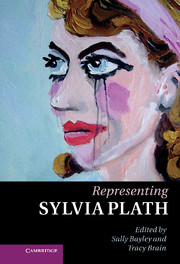Book contents
- Frontmatter
- Contents
- Illustrations
- Notes on contributors
- Acknowledgements
- Abbreviations
- Introduction
- Part I Contexts
- Part II Poetics and composition
- Chapter 5 ‘The trees of the mind are black, the light is blue’
- Chapter 6 Coming to terms with colour
- Chapter 7 ‘Madonna (of the Refrigerator)’
- Chapter 8 ‘Procrustean identity’: Sylvia Plath’s women’s magazine fiction
- Part III Representation
- Bibliography
- Index
Chapter 5 - ‘The trees of the mind are black, the light is blue’
sublime encounters in Sylvia Plath’s ‘tree poems’
from Part II - Poetics and composition
Published online by Cambridge University Press: 07 September 2011
- Frontmatter
- Contents
- Illustrations
- Notes on contributors
- Acknowledgements
- Abbreviations
- Introduction
- Part I Contexts
- Part II Poetics and composition
- Chapter 5 ‘The trees of the mind are black, the light is blue’
- Chapter 6 Coming to terms with colour
- Chapter 7 ‘Madonna (of the Refrigerator)’
- Chapter 8 ‘Procrustean identity’: Sylvia Plath’s women’s magazine fiction
- Part III Representation
- Bibliography
- Index
Summary
The theatrical landscape
In the writing universe of Sylvia Plath, landscapes wield an almost incantatory power. Drawn in particular to the form of the tree, Plath adopted trees as the German Romantic painter Caspar David Friedrich did: as an emblem of the solitary subject hovering on the edge of a sublime encounter. In Plath’s particular mythos, trees figure as aspects of the mind: ‘The trees of the mind are black. The light is blue’, as she put it in ‘The Moon and the Yew Tree’ (1961). These are poems that suggest a search for mental structure and compositional form, a process akin to what the speaker in ‘Stars Over the Dordogne’ (1961) describes as watching stars fall into a ‘twiggy | Picket of trees’. What forms and capacities are hidden within this dark picket, the speaker asks? And what is their relation to the world? How does the night sky that crowns the poem’s larger composition reflect what lies within the human mind? Like Kant, whose work she encountered as an undergraduate at Smith college, the speaker of ‘Stars Over the Dordogne’ looks into the night sky and ponders infinity. What can the mind see and hold in place? and what remains invisible, unknowable? asks the speaker, like the German idealist philosopher before her.
- Type
- Chapter
- Information
- Representing Sylvia Plath , pp. 91 - 109Publisher: Cambridge University PressPrint publication year: 2011
- 1
- Cited by

